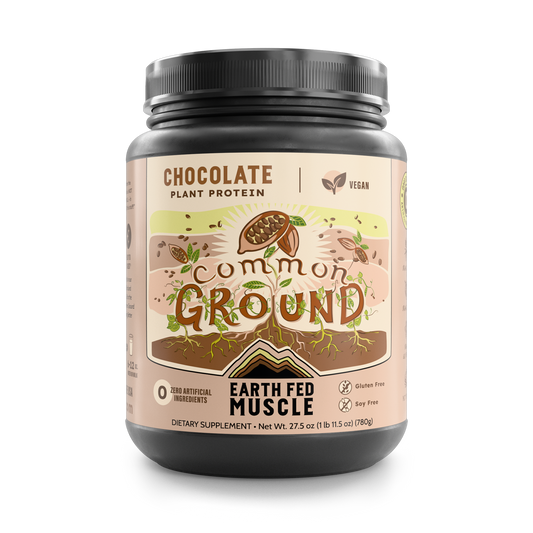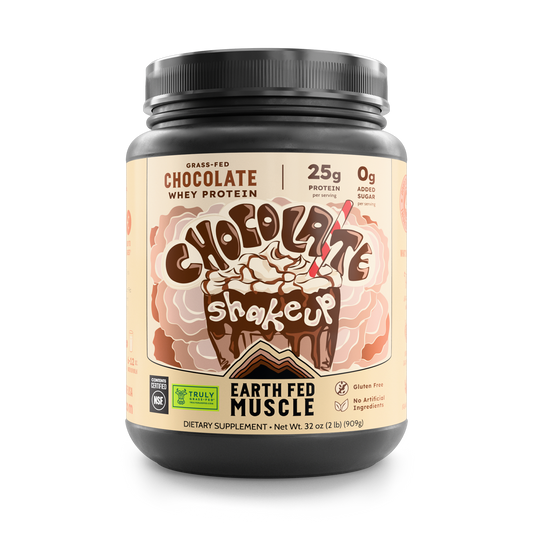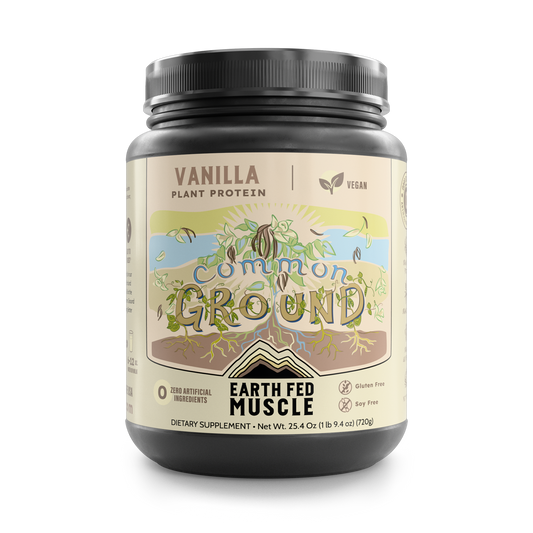When it comes to protein, there are a lot of options. You can get plant-based protein, grass-fed protein, animal protein, processed protein... the list goes on. So which is the best? And more importantly, which is right for you? In this post, we'll compare plant-based and grass-fed proteins to help you decide which one is best for you. Keep reading to learn more!
Muscle building, tissue repair, and essential enzyme production.
These are some of the benefits that protein gives to the body. And for people looking to augment their protein gaps, protein supplements have been proven to be the ideal, quick-fix workaround.
Among all products, whey-based protein supplements are the most common type in the global market. But they might not be as environmentally sustainable as you think.
We’ll delve into the harsh truth about conventional whey more in this article. And we’ll see how it compares against another protein supplement that’s also been making rounds — plant protein — like our Common Ground Chocolate Plant Protein supplement.
Let’s dig in!
What is Protein?
Proteins are one of the body’s primary building blocks, along with carbohydrates, lipids, and nucleic acids. But this macronutrient is the one responsible for the growth, development, and recovery of the body.
It’s no surprise that protein is indeed important for gains. Unfortunately, not all proteins are equal - whey protein has been shown to be slightly more effective in supplementing the body’s protein needs compared to plant protein.
Common Ground Chocolate Plant Protein
$59.99

Battle of the Gains: Plant-Protein vs. Whey Protein
One prime example of whey protein’s superiority over plant protein is its effect on lean muscle mass development and muscle recovery.
A joint investigation of 22 researchers revealed that whey protein promotes muscle development better than soy protein in a calorie-controlled setting. Additionally, a study in 2017 showed supplementation of whey protein after resistance exercise produced improved muscle recovery after 10 hours and 24 hours. Lastly, a critical review concluded that the leucine (an essential amino acid for growth) from plant-based sources is not that high, a component abundant in whey.
Basically, plant-based protein’s effects are not as potent when compared to the benefits of whey protein. Still, plant proteins are richer in other nutrients, such as vitamins, minerals, and fiber, which offer other health benefits.
But from a sustainability standpoint, how do the two fare?
Let’s have a quick revisit to the history of whey protein to learn more.
From Waste to Whey: A Brief Look-Back

Whey is actually a waste by-product — or, “wheyst,” if we’re trying to be funny.
As harsh as that sounds, whey is the leftover liquid after separating the curds (milk solids) during cheesemaking. Early farmers tried to find the best use of whey so they tried making cheese out of it, introducing the ricotta, while others used it to enrich their animal feed.
But there’s always that one guy that says “hey let’s dump the whey into waterways and sewers.” Naturally, given the high sugar and protein, this resulted in detrimental impacts on the environment.
In hopes to resolve this issue, the transformation of whey into protein powders and supplements came to light. And this has been a high-quality by-product ever since.
Chocolate Shakeup Chocolate Grass-Fed Whey Protein
$64.99

The Sustainability of Whey Protein
The history started rough for whey. But after overcoming its illegal dumping, the cheesemaking by-product qualifies as a planet-friendly and sustainable protein source, at the certain degree.
Here’s the catch:
Currently, conventional whey protein is not entirely future-proofed in terms of sustainability.
Given the growing demand for whey-based protein supplements, estimated to be 10% annually, there is a risk that the demand for whey on an industrial scale may outweigh the amount of leftovers produced in the cheesemaking process.
In other words, we start producing cheese not for the cheese, but for the whey.
In other, other words, cheese is now the by-product.
Do you see the problem here?
Dr. Andrew Berardy, an environmental nutrition expert, noted that whey protein production is comparable to plant-based protein given its currently low environmental impact. But the expert from Loma Linda University added that future trends might shift the sustainability tide out of whey protein’s favor.
The remaining sustainable alternative? Plant-based protein.
You might wonder what the heck this is. So let’s talk about that next.
Plant-based Protein: The Savior of Future Gains?

If we take the two sources of protein supplements in perspective, as of writing, both raw materials emit almost equal amounts of carbon footprint during processing.
But that is slowly changing as the demand for whey-based protein outstrips the whey produced when making cheese, or if demand for cheese falls while that of whey-based proteins steadily increase.
Either way, it won’t look good for whey. And plant-based protein supplements will thrive in retrospect.
Although insect-based proteins are now making a scene, there’s still lacking evidence to say which would be the more environmentally sound approach in the future between insects and plants.
But with all the data we have at hand, plant-based protein is more sustainable than whey protein in the long run because its carbon footprint is less sensitive to changes over time, which is not the case for whey.
Common Ground Vanilla Plant Protein
$59.99

So, where does that leave us?
There are always trade-offs whether we choose between whey-based and plant-based proteins.
With whey-based protein supplements, you get slightly higher protein content and better muscle-related benefits, but you may become an early contributor to its potential harm to nature.
On the other hand, plant-based proteins may be less potent, but they’re the more sustainable option in the long run.
Today, you can consume a sustainable kind of whey-based protein - but that's another story we cover in this article.
After all, if the demand for the unsustainable conventional whey protein push comes to shove, you can always count on plant proteins to save the day.
Looking for a plant protein supplement? Check out our Common Ground Chocolate Plant Protein our or new Common Ground Vanilla Plant Protein.
